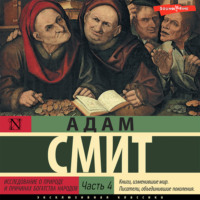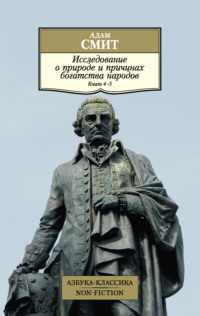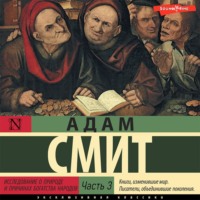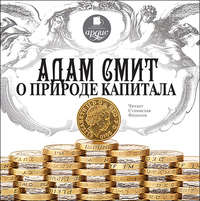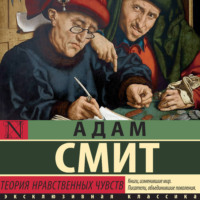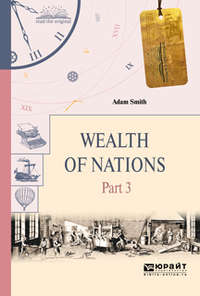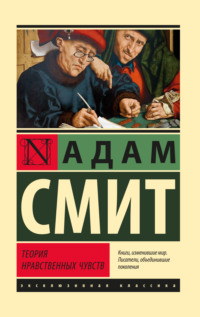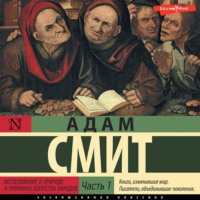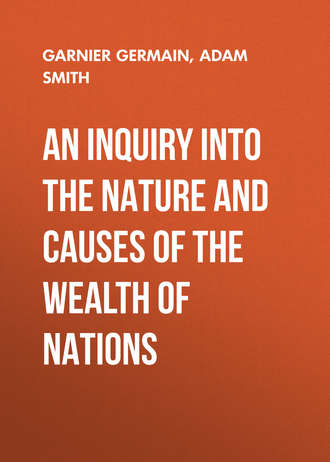 полная версия
полная версияAn Inquiry Into the Nature and Causes of the Wealth of Nations
2
Boswell's Life of Johnson, vol. iv. p. 17
3
Edinburgh Review, vol. i. p. 432.
4
It may not be uninteresting to mention what has been said of the manner in which the writings of Mr. Smith were composed. – 'Mr. Smith observed to me, not long before his death,' says Mr. Stewart, 'that after all his practice in writing, he composed as slowly, and with as great difficulty as at first.' He added, at the same time, that Mr. Hume had acquired so great a facility in this respect, that the last volume of his History was printed from the original copy, with a few marginal corrections. Mr. Smith, when be was employed in composition, generally walked up and down his apartment, dictating to a secretary. All Mr. Hume's works, it has been said, were written with his own hand.
5
This observation, as may easily be perceived, cannot apply in certain indirect imposts, such as those for the support of the roads; which, as they cannot be confounded with the price of any consumable commodity, combine all the inconveniencies of indirect, with those of direct imposts.
6
Plin. Hist. Nat. lib. 33, cap. 3.
7
Pliny, lib. xxxiii. cap. 3.
8
This was written in 1773, before the commencement of the late disturbances.
9
See his scheme for the maintenance of the poor, in Burn's History of the Poor Laws.
10
See Denisart, Article Taux des Interests, tom. iii, p. 18.
11
See Idyllium xxi.
12
See Madox Firma Burgi p. 26 &c.
13
See the Statute of Labourers, 25, Ed. III.
14
Voyages d'un Philosophe.
15
Douglas's Summary, vol. ii, p. 372, 373.
16
See his Preface to Anderson's Diplomata Scotiæ.
17
Lowndes's Essay on the Silver Coin, 68.
18
See Tracts on the Corn Trade, Tract 3.
19
Solorzano, vol. ii.
20
Postscript to the Universal Merchant, p. 15 and 16. This postscript was not printed till 1756, three years after the publication of the book, which has never had a second edition. The postscript is, therefore, to be found in few copies; it corrects several error in the book.
21
See Ruddiman's Preface to Anderson's Diplomata, &c. Scotiæ.
22
Lib. x, c. 29.
23
Lib. ix, c. 17.
24
Kalm's Travels, vol. i, p. 343, 344.
25
See Smith's Memoirs of Wool, vol. i. c. 5, 6, 7. also vol. ii.
26
See Ruddiman's Preface to Anderson's Diplomata, &c. Scotiæ.
27
The method described in the text was by no means either the must common or the most expensive one in which those adventurers sometimes raised money by circulation. It frequently happened, that A in Edinburgh would enable B in London to pay the first bill of exchange, by drawing, a few days before it became due, a second bill at three months date upon the same B in London. This bill, being payable to his own order, A sold in Edinburgh at par; and with its contents purchased bills upon London, payable at sight to the order of B, to whom he sent them by the post. Towards the end of the late war, the exchange between Edinburgh and London was frequently three per cent. against Edinburgh, and those bills at sight must frequently have cost A that premium. This transaction, therefore, being repeated at least four times in the year, and being loaded with a commission of at least one half per cent, upon each repetition, must at that period have cost A, at least, fourteen per cent. in the year. At other times A would enable B to discharge the first bill of exchange, by drawing, a few days before it became due, a second bill at two months date, not upon B, but upon some third person, C, for example, in London. This other bill was made payable to the order of B, who, upon its being accepted by C, discounted it with some banker in London; and A enabled C to discharge it, by drawing, a few days before it became due, a third bill likewise at two months date, sometimes upon his first correspondent B and sometimes upon some fourth or fifth person, D or E, for example. This third bill was made payable to the order of C, who, as soon as it was accepted, discounted it in the same manner with some banker in London. Such operations being repeated at least six times in the year, and being loaded with a commission of at least one half per cent. upon each repetition, together with legal interest of five per cent. this method of raising money, in the same manner as described in the text, must have cost A something more than eight per cent. By saving, however, the exchange between Edinburgh and London, it was less expensive than that mentioned in the foregoing part of this note; but then it required an established credit with more houses than one in London, an advantage which many of these adventurers could not always find it easy to procure.
28
James Postlethwaite's History of the Public Revenue, p. 301
29
Some French authors of great learning and ingenuity have used those words in a different sense. In the last chapter of the fourth book, I shall endeavour to shew that their sense is an improper one.
30
See Brady's Historical Treatise of Cities and Boroughs, p. 3. &c.
31
See Madox, Firma Burgi, p. 18; also History of the Exchequer, chap. 10, sect. v, p. 223, first edition.
32
See Madox, Firma Burgi. See also Pfeffel in the Remarkable events under Frederick II. and his Successors of the House of Suabia.
33
See Madox
34
See Pfeffel
35
See Sandi Istoria civile de Vinezia, part 2, vol. i, page 247 and 256.
36
The following are the prices at which the bank of Amsterdam at present (September 1775) receives bullion and coin of different kinds:
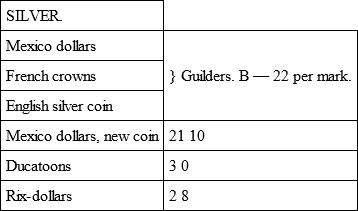
Bar silver, containing 11-12ths fine silver, 21 per mark, and in this proportion down to 1-4th fine, on which 5 guilders are given.
Fine bars, 28 per mark.
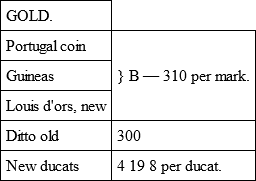
Bar or ingot gold is received in proportion to its fineness, compared with the above foreign gold coin. Upon fine bars the bank gives 340 per mark. In general, however, something more is given upon coin of a known fineness, than upon gold and silver bars, of which the fineness cannot be ascertained but by a process of melting and assaying.
37
This paragraph was written in the year 1775.
38
See the accounts at the end of this Book.
39
Before the 13th of the present king, the following were the duties payable upon the importation of the different sorts of grain:
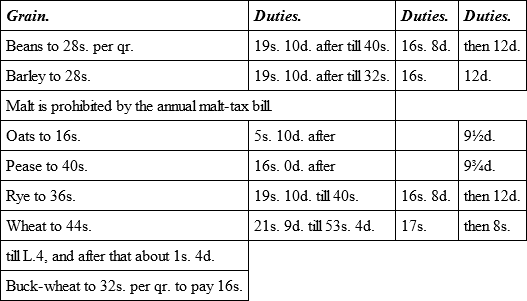
These different duties were imposed, partly by the 22d of Charles II. in place of the old subsidy, partly by the new subsidy, by the one-third and two-thirds subsidy, and by the subsidy 1747.
40
See Dictionnaire des Monnoies, tom. ii. article Seigneurage, p. 489, par M. Abbot de Baringhen, Conseiller-Commissaire en la Cour des Monnoies à Paris.
41
The interest of every proprietor of India stock, however, is by no means the same with that of the country in the government of which his vote gives him some influence. – See book v, chap. i, part ii.
42
See book I chap. I
43
See the Journal of Mr. De Lange, in Bell's Travels, vol. ii. p. 258, 276, 293.
44
Plin. 1. ix. c. 30.
45
Plin. 1. viii. c. 48.
46
They are to be found in Tyrol's History of England.
47
Since publishing the first two editions of this book, I have got good reasons to believe that all the turnpike tolls levied in Great Britain do not produce a neat revenue that amounts to half a million; a sum which, under the management of government, would not be sufficient to keep in repair five of the principal roads in the kingdom.
48
I have now good reason to believe that all those conjectural sums are by much too large.
49
See Memoires concernant les Droits et Impositions en Europe, tome i. page 73. This work was compiled by the order of the court, for the use of a commission employed for some years past in considering the proper means for reforming the finances of France. The account of the French taxes, which takes up three volumes in quarto, may be regarded as perfectly authentic. That of those of other European nations was compiled from such information as the French ministers at the different courts could procure. It is much shorter, and probably not quite so exact as that of the French taxes.
50
See Memoires concernant les Droits et Impositions en Europe tome i. p. 73.
51
See Sketches of the History of Man page 474, and Seq.
52
Memoires concernant les Droits, p. 240, 241.
53
Memoires concernant les Droits, &c. tom. i. p. 114, 115, 116, &c.
54
Id. tom. i. p. 83, 84.
55
Id. p. 280, &c.; also p. 287, &c. to 316.
56
Memoires concernant les Droits, &c. tom. ii. p. 139, &c.
57
Since the first publication of this book, a tax nearly upon the above-mentioned principles has been imposed.
58
Memoires concernant les Droits, &c. p. 223.
59
Memoires concernant les Droits, tom. i, p. 74.
60
Memoires concernant les Droits, tom. i, p. 163, 167, 171.
61
Memoires concernant les Droits, &c. tom. ii. p. 17.
62
Lib. 55. See also Burman, de Vectigalibus Pop. Rom. cap. xi. and Bouchaud de l'impot du vingtieme sur les successions.
63
See Memoires concernant les Droits, &c. tom. i. p. 225.
64
Memoires concernant les Droits, &c. tom. i. p. 154.
65
Id. p. 157.
66
Memoires concernant les Droits, &c. tom. i. p. 223, 224, 225.
67
Memoires concernant les Droits, &c. tom. ii. p. 108.
68
Memoires concernant les Droits, &c. tom. iii. p. 87.
69
See book i. chap. 8.
70
Memoires concernant les Droits, &c., p. 210, 211.
71
Le Reformateur
72
Though the duties directly imposed upon proof spirits amount only to 2s. 6d. per gallon, these, added to the duties upon the low wines, from which they are distilled, amount to 3s. 102⁄3d. Both low wines and proof spirits are, to prevent frauds, now rated according to what they gauge in the wash.
73
The neat production of that year, after deducting all expenses and allowances, amounted to L.4,975,652: 19: 6.
74
Memoires concernant les Droits, &c. tom. 1, p. 45
75
See Examen des Reflections Politiques sut les Finances.
76
See James Postlethwaite's History of the Public Revenue.
77
It has proved more expensive than any one of our former wars, and has involved us in an additional debt of more than one hundred millions. During a profound peace of eleven years, little more than ten millions of debt was paid; during a war of seven years, more than one hundred millions was contracted.
78
See Du Cange Glossary, voce Moneta; the Benedictine Edition.
79
See Hutchinson's History of Massachusetts Bay vol. ii, page 436, et seq.


